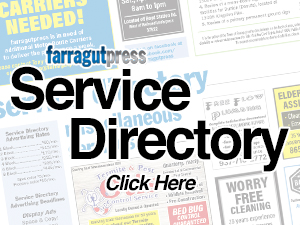Recovery series is launched
“Just breathe” and “don’t panic,” local marketing professionals advised businesses in Farragut West Knox Chamber of Commerce’s first online webinar session of Recovery Roadmap: Making Your Business Marketing Ready, on Tuesday, April 14, which focused on advertising.
“We wanted to launch an educational series in person,” said Julie Blaylock, FWKCC CEO/president, adding the Chamber planned to host it at Farragut Community Center, kicking off April 6, “but obviously that didn’t happen.
“So we replaced it with this. Right now we’re looking at making this a three-part series,” Blaylock added. (The second in the series was held Tuesday, April 21.)
FWKCC brought together Tom Sharp, account executive with Viamedia, which works with cable TV companies; Daniel Monday, COO with Slamdot, which provides digital marketing; and Angela Bridges, account executive with Cumulus Media, which owns several radio stations, to share tips on how to prepare for the end of COVID-19.
While things might be slow now, “there is plenty you can do to strategize and get ready to promote your business to a successful recovery,” Blaylock stated.
Sharp, Monday and Bridges listed planning, researching, tracking what advertising methods are most effective and keeping the business’ message and call to action simple as the keys to surviving the pandemic and carrying forward.
“A lot of people are in panic mode, wondering what’s going to happen in uncertainty,” Bridges said. “I would say the main thing is if you are advertising, continue to advertise.
“The companies that stay with advertising and keep the sales process going are the ones who are going to fare (best) during these times,” she added. “There never, ever is a good time to stop marketing.”
Sharp agreed that advertising should continue to keep a business’s name in the forefront.
“You’ve got to be known before you’re needed,” he said, noting a person may not need that particular business right now, but “when the time comes, when that triggering action happens,” the business will be on the customer’s mind.
Monday also agreed advertising should continue, adding, “Pretty much everybody’s in survival phase, and you’ve got rebuild.
“A lot of people are innovating as best they can, offering certain services, so in terms of the rebuild phase you want to start planning,” he advised.
Monday noted if a business does not have a plan, when the rebuild begins “you are going to be all over the place.
“That applies for pretty much anytime, good times or bad,” he added. “Plan, plan, plan now so you are ready to roll when you can pull the trigger.”
Monday suggested businesses should think about their message.
“You have to have a message about what you want to promote during that rebuild phase that’s going to get people in the door, calling, e-mailing,” he said.
Sharp and Bridges both advised to keep the message simple.
“The key is to be very simple in what you say, very pointed in what you say and right now people are just needing a little empathy,” Bridges added.
“People are changing their message,” she added. “They’re trying to be very empathetic to what is going on. The main thing is they want people to know they are in business.”
Bridges said she has seen businesses letting people know they offer curbside service.
“There are all kinds of ways you can get people enticed to come into your business. Surprisingly, advertising is not off for us, as much as one would think,” she es added. “I was panicked going in that people would be canceling left and right, (but) people are staying the course.”
Sharp said he has seen some cancellations but not a lot of change. The main message he has seen from his customers is “We’re still open; we’re still in business; we will take care of you.”


